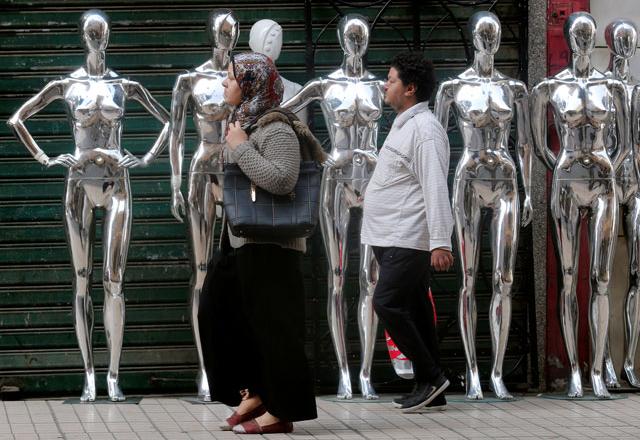You are here
Despite Egypt reforms, investors seen wary of returning
By AFP - Feb 26,2017 - Last updated at Feb 26,2017

People walk next to mannequins outside shops in Cairo on Sunday (Reuters photo)
By Maram Mazen
CAIRO — Egypt is pursuing a raft of reforms to try to revive an economy weakened by years of turmoil, but analysts say that wooing foreign investors will take time.
Since the 2011 uprising, the Arab world’s most populous nation has suffered a slump in key tourism revenues, slowing economic growth and investment, double-digit inflation and falling foreign currency reserves.
In November, the International Monetary Fund (IMF) approved a $12 billion loan for Egypt after the government committed to reforms, including floating the Egyptian pound, which subsequently plunged against the US dollar.
The authorities also pledged a new investment law with tax incentives, a “one-stop-shop” to simplify investment procedures and a new bankruptcy law.
“Egypt’s economic recovery will come with a lag, until the government follows through on reform policies with a successful implementation,” said Hany Farahat, a senior economist at the Egyptian investment bank CI Capital.
The authorities have also introduced a value-added tax and cut fuel subsidies, moves the IMF said were required to fix government finances and boost investor confidence.
“Everyone is expecting 2017 to be a difficult year,” said Walid Allam, the chief financial officer in Egypt for Swiss elevator manufacturer Schindler.
“But we expect that starting in 2018 there will be a bit of a revival,” he told AFP. “We are talking about a state, not a company that would take a decision and profit from it after a week or two.”
Foreign direct investment in Egypt has fallen from a peak of $13.2 billion in the fiscal year ending in June 2008, to $6.8 billion in the year ending in June 2016.
The tourism sector in particular is reeling from years of upheaval and a series of terrorist attacks, including the 2015 bombing of a Russian airliner carrying holidaymakers home from the popular Red Sea resort of Sharm El Sheikh.
Even before the tumultuous 2011 uprising that ousted longtime president Hosni Mubarak, Egypt’s economy was suffering from decades of structural problems and delayed reforms, said Ahmed Abdelnaby, a strategist at Mubasher Financial Services.
Investors will need time to see the government’s commitment to reforms if the business climate is overhauled, he said.
One of the challenges for Egypt is to diversify its sources of foreign currency, said political economist Amr Adly, non-resident scholar at the Carnegie Middle East Centre.
This is particularly important as the main sources now — workers’ remittances, crude oil exports, the Suez Canal and tourism — “proved to be very volatile and cannot be depended on”, said Adly.
A key part of the government’s efforts should be directed to improving the business climate and reducing bureaucracy for small and medium enterprises and not just foreign investors, he said.
This would help boost local industries, including agriculture and manufacturing, he said.
Potential investors are keen to see additional structural reforms before committing to long-term investments, said Esraa Ahmed, an economist with Mubasher.
She thinks that more than half of the problems facing investors still need to be resolved.
“Investors have always suffered obstacles in procedures, corruption, and bureaucracy. Reforming these issues will take some time,” she added.
The former chairman of the General Authority for Investment, Ziad Bahaa-Eldin, said that fixing “genuine barriers” to investment would have a bigger impact than a new investment law.
These include “the state’s unclear economic and social vision, its competition with the private sector in all fields, the spread of corruption, and clogged, slow courts, as well as security and political conditions,” he wrote in an article for the Ahram Online news website.
Despite the remaining challenges, there are signs that investors are responding positively to the reforms.
In January, Egypt sold $4 billion of dollar-denominated bonds on international markets, almost double its initial target.
“Every time I attend a discussion one can sense that officials are aware of everything they should be doing,” said an official at a multinational company.
Related Articles
AMMAN — Moody’s latest rating of Jordan, which has upgraded its credit outlook from B1 — stable to B1 — positive, indicates promising econom
The consultant on a project to develop the Suez Canal says cumbersome Egyptian government bureaucracy could hamper its chances of success.
CAIRO — Egyptian President Abdel Fattah Al Sisi has revived economic growth and tackled pressing problems in power and gas supply.













